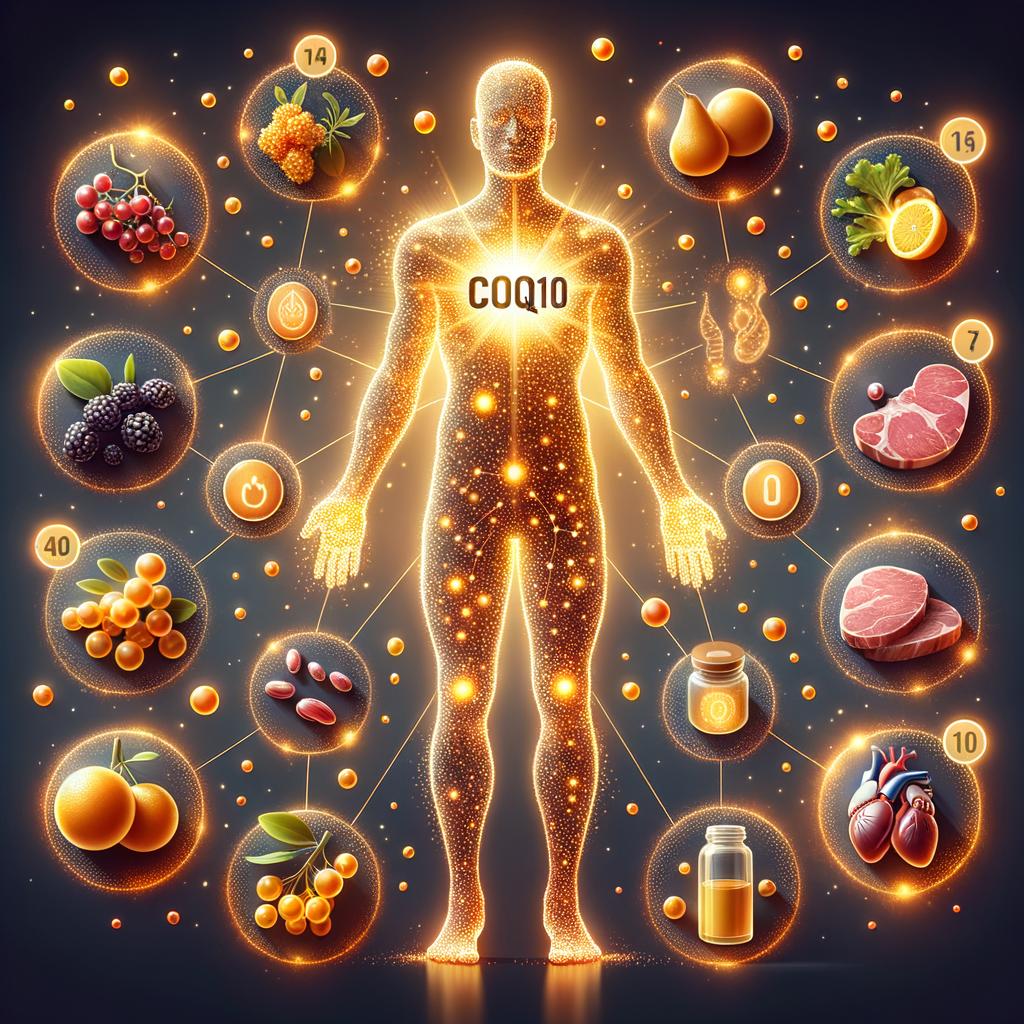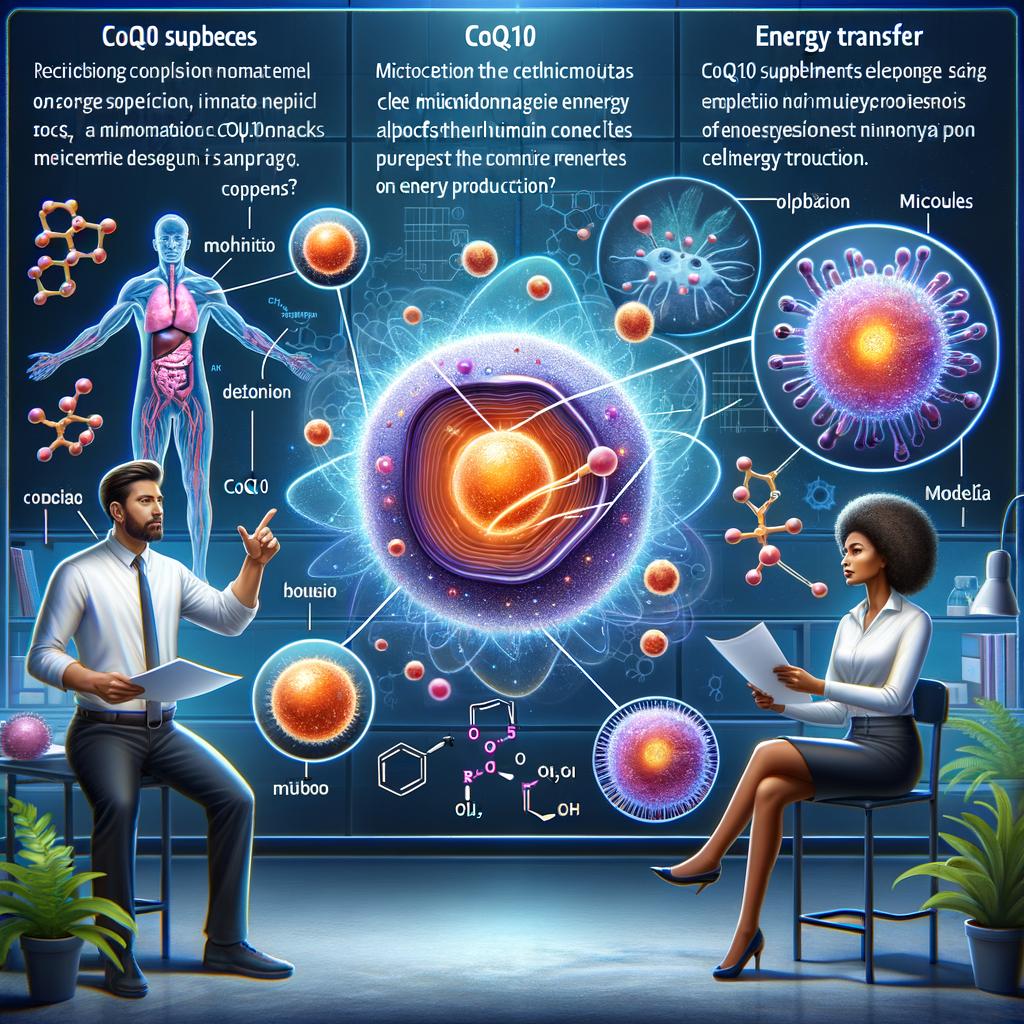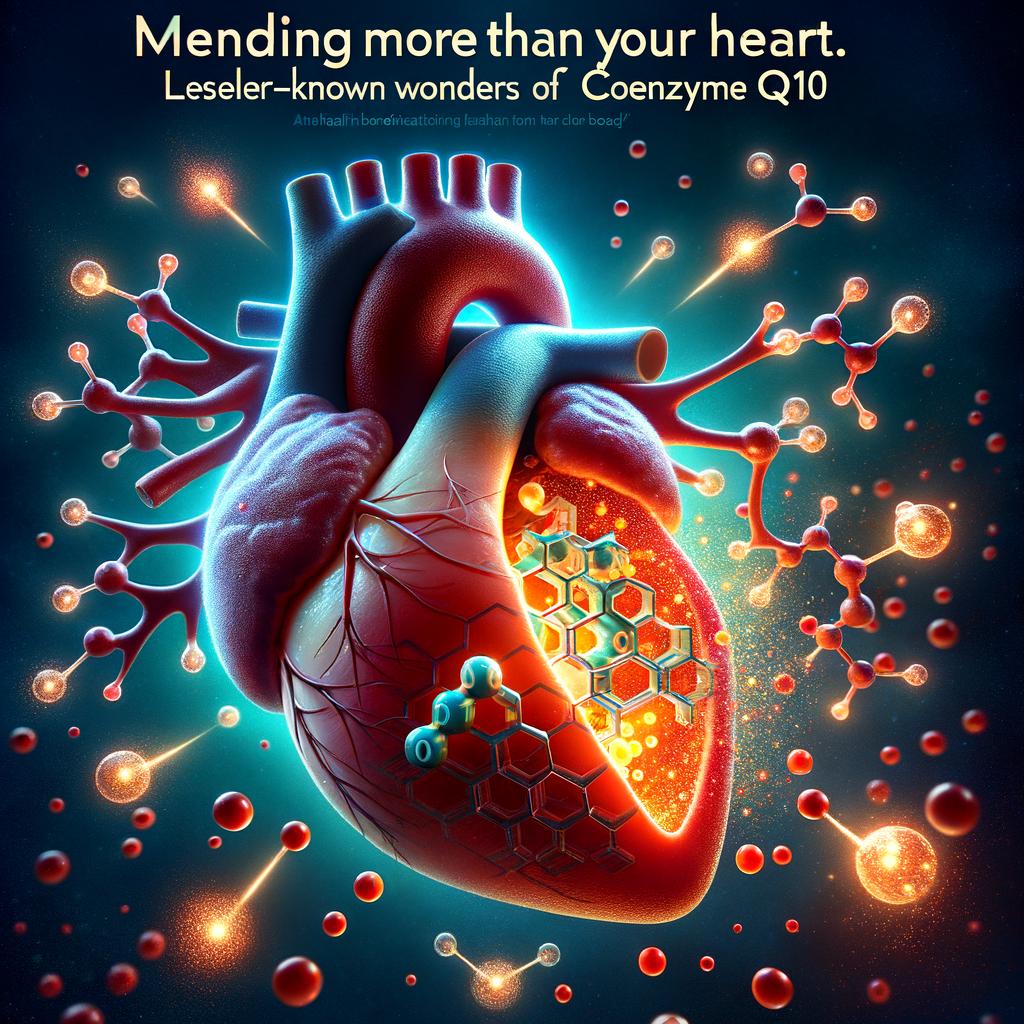Welcome to a refreshing new blog post, springing with vibrant health advice and tips you won’t want to miss. In today’s intriguing episode, we are unravelling the secrets and bountiful benefits of the unsung health guardian dwelling within us – coenzyme Q10. Packed like a treasure chest with an array of essential health functionalities, this coenzyme is a jack-of-all-trades when it comes to safeguarding our wellness. Based on our recent YouTube video “Unveiling the Vigor Vital: The Remarkable Health Perks of CoQ10” we are going to excavate the incredible benefits of this enzyme that range from protecting cells to combating age-related health dilemmas. From the intricate workings of your heart to the quality of your sperm, get ready to be amazed at how this mighty molecule plays a crucial role in steering our health towards the road of flourishing. Buckle up as we dive deep into an ocean of health insights!
Table of Contents
- Unraveling the Powerhouse of Health: The Many Benefits of CoQ10
- From Heart to Skin: The Broad Spectrum of Coenzyme Q10’s Medicinal Applications
- Energize Your Cells: How CoQ10 Supplements can Change Your Life
- Reversing the Clock with CoQ10: Aiding Fertility and Slowing Age-Related Decline
- Mending More Than Your Heart: Lesser-Known Wonders of Coenzyme Q10
- How a Powerful Antioxidant Meets Dietary Deficiency: CoQ10 in Your Daily Life.
- Q&A
- Concluding Remarks
Unraveling the Powerhouse of Health: The Many Benefits of CoQ10

Well-established as an enzymatic powerhouse, Coenzyme Q10 (CoQ10) offers a fascinating range of health benefits. Predominantly recognized for its substantial role in energy generation within our cells, this enzyme also functions as a potent antioxidant, shielding our cells from the harsh implications of aging. More so, CoQ10 manifests anti-inflammatory characteristics, validating its integration into various medical protocols over the years, particularly those related to heart issues.
This enzyme is organically available within the human body, with key concentrations in the heart, liver, kidneys, and pancreas. However, our capacity to produce CoQ10 naturally wanes as we age. Evidence suggests that several factors can influence this downtrend, such as genetic defects, nutritional deficiencies, diseases impacting mitochondria, consumption of statin drugs, and enduring chronic diseases. These include diabetes, cancer, and congestive heart failure. A diversified assortment of foods can supplement our CoQ10 levels, incorporating items like eggs, different types of nuts, chicken, whole grains, oily fish like salmon, mackerel and sardines, and organ meats such as liver and hearts.
Noteworthy Health Perks of CoQ10:
- May help treat heart failure by decreasing oxidative stress and enhancing heart function
- Proven to improve insulin sensitivity and regulate blood sugar levels
- May reduce muscle pain from statins
- Shown to increase blood pressure levels
- Aids in combating female and male infertility, enhancing both quality and quantity
- Found to improve sperm quality, activity, and concentration
- Can help with erectile dysfunction when coupled with blood pressure medications
- May reduce migraine headaches
- Applying CoQ10 directly on skin may help reduce oxidative damage caused by UV rays and decrease wrinkles
- May improve periodontal gum disease
These staggering benefits underscore the need to maintain adequate CoQ10 levels in our bodies. In the event of a CoQ10 deficiency, oral supplementation may be considered to ensure optimal health.
From Heart to Skin: The Broad Spectrum of Coenzyme Q10’s Medicinal Applications
Coenzyme Q10, or CoQ10, is a potent enzyme found within our body that is tasked with generating energy for our cells. Serving as a powerful antioxidant, it defends our cells against the damaging effects of aging. This enzyme also possesses significant anti-inflammatory properties, which have proven extremely beneficial in medical practices, particularly in treating heart problems. Notably, your body naturally contains CoQ10, with the heart, liver, kidneys, and pancreas housing the maximum concentration.
However, the body’s CoQ10 production decreases as we age. Other causes contributing to lower CoQ10 levels include genetic defects, nutritional deficiencies, high levels of oxidative stress, mitochondrial diseases, statin drugs intake, and chronic diseases such as diabetes and cancer. There are certain foods that are rich in CoQ10, including eggs, nuts, chicken, whole grains, oily fish like salmon, mackerel, and sardines, and organ meats like liver and heart. If you have a CoQ10 deficiency, supplements are available that can boost your CoQ10 level and assist in providing numerous health benefits.
Stunningly, CoQ10 shows extraordinary medicinal applications in diverse health sectors. Cardiovascular Health: Studies indicate that CoQ10 supplement consumption leads to a lower mortality risk and improved exercise capacity in heart failure patients by reducing oxidative stress and enhancing
heart function. Metabolic Function: CoQ10 may also better insulin sensitivity and control blood sugar levels. If you are grappling with muscle pain from statins, CoQ10 could be beneficial. It could also help decrease blood pressure levels.
Reproductive Health: There is promising research that suggests CoQ10 may improve both female and male infertility by reversing age-related quality and quantity decline. Evidence points to CoQ10’s potential to enhance sperm quality, activity, and concentration through increased antioxidant protection. Studies show that men with mild erectile dysfunction benefitted from CoQ10 supplementation, with a significant percentage no longer experiencing symptoms.
Additionally, CoQ10 seems to have an immense potential in treating neurological disorders and skin health: It may aid in reducing migraine headaches and protect the skin against damage. Topical application of CoQ10 on the skin has shown a reduction in oxidative damage caused by UV rays and potentially decrease wrinkles. Preliminary studies also suggest that CoQ10 may improve periodontal gum diseases.
Energize Your Cells: How CoQ10 Supplements can Change Your Life

Coenzyme Q10 (CoQ10) is an enzyme that plays a key role in the energy production processes of your cells. Acting as a potent antioxidant, it shields cells from the effects of aging. Furthermore, it has anti-inflammatory qualities which make it effective in mitigating heart problems. It is naturally produced in our bodies, most notably in the heart, liver, kidneys, and pancreas. However, CoQ10 levels tend to drop with aging. Other precipitating factors include nutritional deficiencies, mitochondrial diseases, high oxidative stress levels, particular genetic defects, statin drug use, and chronic diseases such as cancer, diabetes, and congestive heart failure.
To remedy a CoQ10 deficiency, consider incorporating CoQ10-rich foods into your diet, such as eggs, nuts, chicken, whole grains, oily fish (a good example being salmon, mackerel, and sardines), and organ meats (for instance, liver, hearts, or brains). You can also acquire CoQ10 in supplement form. Some remarkable benefits you stand to gain from consuming CoQ10 supplements include:
- May decrease chances of succumbing to heart failure, due to better heart function and decreased oxidative stress.
- Enhance insulin sensitivity and blood sugar level regulation.
- May reduce muscle pain caused by statin medication use.
- Can regulate and improve blood pressure levels.
- Enhancement of both female and male fertility through reversal of age-related decline in egg and sperm quality, respectively.
| Condition | Benefits from CoQ10 |
|---|---|
| Erectile dysfunction | Improvement is often seen due to CoQ10’s beneficial properties. |
| Migraine headaches | There’s potential for significant improvement in the severity and frequency of migraines. |
| Skin damage | Application of CoQ10 can help reduce oxidative damage caused by UV rays and may decrease wrinkles. |
| Gum disease | CoQ10 has been shown to help improve periodontal gum diseases. |
Reversing the Clock with CoQ10: Aiding Fertility and Slowing Age-Related Decline
Coenzyme Q10, more commonly referred to as CoQ10, is a vital enzyme that generates energy within our cells. Acting as a robust antioxidant, it guards our cells against the detrimental consequences of aging. Beyond this quintessential role, CoQ10 possesses anti-inflammatory properties and has been widely utilized in medical arenas, particularly in the treatment of heart troubles. Moreover, the highest concentration of this enzyme can be located in heart, liver, kidneys, and pancreas.
Unfortunately, the production of CoQ10 tends to witness a downward trend with age. This reduction could also be spurred by genetic mutations, poor nutrition, heightened levels of oxidative stress, mitochondrial ailments, intake of statin medications, and presence of chronic diseases like diabetes and cancer. Incorporating certain foods in your diet can help keep its levels in check – rich sources include eggs, nuts, chicken, whole grains, oily fish (like salmon, mackerel, and sardines) and organ meats (like liver, heart, or brains). For those grappling with a CoQ10 deficit, supplements can provide a viable solution.
| CoQ10 benefits |
|---|
| Helps treat heart failure |
| Improves insulin sensitivity |
| Regulates blood sugar levels |
| Reduces muscle pain from statins |
| Improves blood pressure |
| Aids both female and male fertility |
| Can help in treating erectile dysfunction |
| Reduces frequency and severity of migraines |
| Offers protection against skin damage |
| Boosts periodontal (gum) health |
Mending More Than Your Heart: Lesser-Known Wonders of Coenzyme Q10

Coenzyme Q10 (CoQ10) isn’t just an effective tool for healing your heart; it carries an array of other health benefits that are often overlooked. Naturally present in the human body, especially in the heart, liver, kidneys and pancreas, the enzyme acts as a vigorous antioxidant, countering the harmful effects of aging on cells. Certain foods, such as eggs, nuts, chicken, whole grains, oily fish and organ meats, are rich in CoQ10. However, as CoQ10 production decreases with age, health conditions, or certain medications, supplementation might be necessary.
Not only does CoQ10 help to improve outcomes in heart failure treatment by alleviating oxidative stress and enhancing heart function, it also greatly improves insulin sensitivity and blood sugar regulation. Moreover, it cuts down muscle discomfort from statin drugs and betters blood pressure levels. CoQ10 has significant fertility-boosting effects as well. With regular supplemental consumption, it has shown to aid in reversing age-associated declines in egg quantity and quality and improve sperm quality, activity, and concentration by escalating antioxidant protection. This makes it a potent tool in dealing with both male and female infertility.
| Area of Benefit | Effect |
|---|---|
| Heart Health | Decreases risk of dying and enhances exercise capacity |
| Diabetes Management | Improves insulin sensitivity and regulates blood sugar levels |
| Fertility | Boosts egg and sperm quality and activity |
| Skin Health | Reduces oxidative damage caused by UV rays and decreases wrinkles |
| Gum Health | Improves periodontal gum disease |
From the findings, it’s evident that CoQ10 has a role beyond mending hearts, making it a versatile supplement for holistic health and well-being.
How a Powerful Antioxidant Meets Dietary Deficiency: CoQ10 in Your Daily Life
CoQ10, or Coenzyme Q10, is a peptide that our cells engage to cultivate energy for growth and preservation. CoQ10 also operates as a potent antioxidant that secures cells from external damage. Apart from anti-inflammatory properties, this enzyme is widely employed in healthcare, mainly to rectify heart-related issues. Our bodies intrinsically produce CoQ10, with the highest concentrations typically found in the heart, liver, kidneys, and pancreas. Some of the causes for low CoQ10 levels, aside from aging, incorporate genetic defects, nutritional deficiencies, high levels of oxidative stress, mitochondrial diseases, intake of statin drugs, and chronic diseases like diabetes, cancer, or congestive heart failure.
However, combating CoQ10 deficiency can be as straightforward as incorporating certain foods in your regular diet. Eggs, nuts, chicken, whole grains, and oily fish like salmon, mackerel, and sardines are some primary sources. Additionally, organ meats such as liver, hearts, or brains provide an ample supply of this vital enzyme. For those struggling to meet their CoQ10 needs through diet, supplements are readily available. Studies indicate that consuming CoQ10 supplements can help in treating heart failure and drastically reducing the risk of premature death. The application of CoQ10 also enhances heart functionality, improves treatment results for heart failure, boosts insulin sensitivity, regulates blood sugar levels, and reduces muscle pain caused by statin drugs.
| COQ10 Benefits | Description |
|---|---|
| Boosts fertility | It aids in reversing an age-induced decline in egg quality and quantity. It also enhances sperm quality, activity, and concentration. |
| Erectile dysfunction | Some studies show that daily consumption of 200 milligrams of coenzyme Q10 for three months can improve mild erective dysfunction. |
| Reduces migraines | Those suffering from migraines may find relief through the intake of CoQ10 supplements. |
| Skin protection | Applying coenzyme Q10 on the skin can reduce oxidative damage caused by UV rays and also decrease wrinkles. |
| Gum disorder treatment | Consumption of CoQ10 can be helpful in treating periodontal gum disease. |
Q&A
Q: What is coenzyme Q10 and what does it do in the body?
A: Coenzyme Q10, also known as CoQ10, is an enzyme that helps generate energy in our cells. It acts as a powerful antioxidant, protecting cells from the effects of aging. It also has anti-inflammatory properties and has been used in medical practices for decades, especially for treating heart problems.
Q: Where is coenzyme Q10 naturally present in the body?
A: Coenzyme Q10 is naturally present in the human body, with the highest levels found in the heart, liver, kidneys, and pancreas.
Q: Why does the production of coenzyme Q10 decrease with age?
A: The production of coenzyme Q10 tends to decrease with age. Other causes of low coenzyme Q10 levels include genetic defects, nutritional deficiencies, high levels of oxidative stress, mitochondrial diseases, taking statin drugs, and having chronic diseases such as diabetes, cancer, and congestive heart failure.
Q: What are some foods that contain coenzyme Q10?
A: Foods that contain coenzyme Q10 include eggs, nuts, chicken, whole grains, oily fish (such as salmon, mackerel, and sardines), and organ meats (such as liver, hearts, or brains).
Q: Is coenzyme Q10 available as a supplement?
A: Yes, coenzyme Q10 is available as a supplement and can be helpful if there is a coenzyme Q10 deficiency.
Q: How can coenzyme Q10 benefit those with heart failure?
A: Studies have shown that consuming coenzyme Q10 supplements can decrease the risk of dying and improve exercise capacity in people with heart failure. It may also help decrease oxidative stress, enhance heart function, and improve treatment outcomes.
Q: Can coenzyme Q10 improve insulin sensitivity and regulate blood sugar levels?
A: Yes, coenzyme Q10 has been found to improve insulin sensitivity and regulate blood sugar levels.
Q: Can coenzyme Q10 help with muscle pain caused by statins?
A: Yes, coenzyme Q10 may reduce muscle pain caused by statin drugs.
Q: Can coenzyme Q10 improve blood pressure levels?
A: Yes, coenzyme Q10 has the potential to improve blood pressure levels.
Q: Can coenzyme Q10 improve fertility?
A: Studies have shown that consuming coenzyme Q10 supplements may help reverse age-related decline in fertility in both females and males. It may improve sperm quality, activity, and concentration by increasing antioxidant protection.
Q: Can coenzyme Q10 help with erectile dysfunction?
A: Yes, studies have shown that men who had mild erectile dysfunction and high blood pressure experienced improvement in their symptoms when consuming 200 milligrams daily of coenzyme Q10 for three months, along with their high blood pressure medications.
Q: Can coenzyme Q10 reduce migraine headaches?
A: Yes, consuming coenzyme Q10 supplements for three months may help reduce migraine headaches.
Q: Can coenzyme Q10 protect the skin against damage?
A: Studies have shown that applying coenzyme Q10 directly to the skin may help reduce oxidative damage caused by UV rays and decrease wrinkles.
Q: Can coenzyme Q10 improve periodontal gum disease?
A: Some studies have shown that consuming coenzyme Q10 may improve periodontal gum disease.
Concluding Remarks
And with that, we hit the final note on our deep dive into the remarkable health benefits of a not-so-commonly heard about enzyme, Coenzyme Q10. From its impressive antioxidant, anti-inflammatory properties to its potential for enhancing heart health, managing blood sugar levels, and even reversing some aspects of age-related decline, CoQ10 truly steals the spotlight.
If you happen to be battling anything from migraines, periodontal gum disease to muscle pain from statins, or even infertility, CoQ10 might just be worth exploring. And remember, even if you have your health in check, you might just benefit from its protective capabilities against the wear and tear of time on your skin. Remember, always consider discussing your plans with a healthcare professional before incorporating new supplements into your routine.
So whether you decide to increase your intake through nutrition—hello, chicken, eggs, and sardines—or opt for a readily available supplement, one thing is for certain; incorporating CoQ10 into your lifestyle can bring about a vigor vital that was perhaps, until now, untapped. Remember, invest in your health today to enjoy the dividends later. Thanks for staying tuned, and don’t forget to like, share, and subscribe for more health revelations. Cheers to your health!



